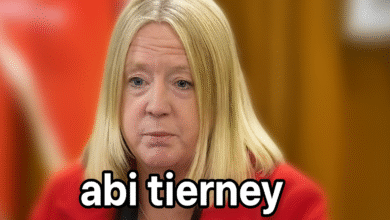Graham Poll: The Fearless English Referee Who Redefined Football Integrity
From the World Cup spotlight to inspiring leadership beyond the pitch

Table of Contents
ToggleIntroduction
Graham Poll, an English former association football referee, remains one of the most recognizable and talked-about officials in football history. Known for his fearless decision-making, unwavering integrity, and the high-pressure moments that defined his career, Poll’s journey reflects the triumphs and trials that come with being at the center of the world’s most passionate sport. His legacy continues to influence refereeing standards, sportsmanship, and the wider conversation on fairness in football.
Poll’s rise from local league games in Hertfordshire to officiating at FIFA World Cups and European Championships stands as a remarkable story of perseverance, discipline, and professionalism. Despite facing controversies and criticism, he emerged as a respected voice for accountability and learning through adversity.
Quick Bio
| Attribute | Detail |
|---|---|
| Full Name | Graham Poll |
| Date of Birth | 29 July 1963 |
| Birthplace | Hitchin, Hertfordshire, England |
| Nationality | British (English) |
| Occupation | English Former Association Football Referee |
| Education | Ashtree Junior School, Alleyne’s School |
| Wife | Julia Poll (deceased 2023) |
| Children | Gemma, Josie, and Harry |
| Career Start | 1980 |
| Premier League Debut | 1993 |
| FIFA Referee Badge | 1996 |
| Retirement | 2007 |
| Book | Seeing Red (2007) |
| Philanthropy | Breast Cancer Now fundraiser (2025) |
Early Life and Background
Born on 29 July 1963 in Hitchin, Hertfordshire, Graham Poll showed determination and a disciplined mindset from a young age. Educated at Ashtree Junior School and Alleyne’s School, he was an active sports enthusiast with a deep fascination for football’s structure and authority on the field. His early life in Hertfordshire molded his strong character and moral foundation — qualities that would define his refereeing style.
Before refereeing full-time, Poll worked in sales and management roles, learning leadership and communication skills that later proved vital in controlling football matches involving world-class players and intense emotions. His ability to make quick, decisive judgments was evident even before his professional refereeing days.
Journey into Refereeing
Poll’s officiating career began in 1980, when he started refereeing local league matches. His dedication, discipline, and command of the game earned him quick recognition. By 1986, he was appointed as an assistant referee in the Football League, and five years later, in 1991, he became a full Football League referee.
His sharp understanding of the laws of the game and consistent performance led to his inclusion in the Premier League referee list in 1993. For many fans, Poll represented the new face of English officiating — confident, communicative, and ready to embrace modern football’s challenges.
International Recognition and Career Milestones
Poll’s career reached global recognition in 1996, when he received the FIFA badge, granting him the authority to officiate international and European matches. Over the years, he took charge of prestigious games, including:
-
UEFA Euro 2000 matches such as France vs. Czech Republic
-
2002 FIFA World Cup fixtures including Italy vs. Croatia
-
2005 UEFA Cup Final between CSKA Moscow and Sporting Lisbon
In 2006, Poll was chosen as England’s only referee for the FIFA World Cup in Germany, a testament to his exceptional standing among global officials. His firm personality and fairness made him one of the most respected referees of his generation.
Challenges and Controversy
Every great career faces its defining test. For Graham Poll, that moment arrived during the Croatia vs. Australia match in the 2006 FIFA World Cup, where he mistakenly issued three yellow cards to Croatian defender Josip Šimunić before sending him off. The error, which shocked global audiences, became one of the most discussed incidents in football refereeing history.
Rather than hiding from criticism, Poll addressed the mistake openly, acknowledging it as a human error. This transparency strengthened his reputation for honesty and professionalism. The incident also sparked global discussions about technology and communication improvements in officiating — leading to systems like VAR years later.
Retirement and Post-Refereeing Career
After an illustrious run of over 1,500 professional matches, Graham Poll retired in 2007. His final game, the Championship Play-Off Final between Derby County and West Bromwich Albion, marked the end of an era for English refereeing.
Following retirement, Poll reinvented himself as a media analyst, columnist, and motivational speaker. He writes a regular feature titled “The Official Line” for the Daily Mail, offering expert insight into controversial football moments and referee decisions. His articulate and balanced approach has made him a trusted authority in sports journalism.
As a public speaker, Poll delivers keynote talks on leadership, pressure management, and ethics in decision-making — drawing parallels between football and corporate life. His experiences continue to inspire audiences seeking to perform under pressure with integrity and confidence.
Personal Life and Philanthropy
Poll was married to Julia Poll, with whom he had three children — Gemma, Josie, and Harry. After Julia’s passing in 2023, Poll honored her memory by raising funds for Breast Cancer Now. In 2025, he walked the South West Coastal Path, covering 630 miles in 52 days, and raised £15,000 for cancer research.
Beyond football, Poll has shown compassion and dedication to causes that impact families and communities. His charitable work reflects the same integrity and determination that characterized his refereeing career.
Legacy and Influence
Graham Poll’s name has become synonymous with discipline, courage, and transparency in refereeing. He is widely regarded as one of England’s most experienced and outspoken referees, remembered for both his bold decisions and his willingness to admit mistakes.
His career symbolizes both the pressure and honor of officiating at the highest level of football. By turning challenges into opportunities for growth, Poll transformed his experiences into lessons that benefit referees and sports professionals worldwide.
Through his writing, media appearances, and public speaking, Poll continues to shape the conversation around fair play, ethics, and leadership — proving that true success lies not in perfection, but in perseverance and integrity.
Conclusion
Graham Poll’s life is a story of resilience, reflection, and reinvention. From managing heated World Cup matches to influencing modern refereeing discussions, his journey showcases the courage it takes to lead with integrity. Despite controversies, his openness, wisdom, and contributions have earned him lasting respect both inside and outside football.
As an English former association football referee, Poll’s influence reaches beyond the stadium — reminding us that even in moments of error, honesty and professionalism create a legacy that time cannot erase.
FAQs
Q1: Who is Graham Poll?
Graham Poll is an English former association football referee known for officiating in the Premier League, UEFA, and FIFA World Cup tournaments.
Q2: When was Graham Poll born?
He was born on 29 July 1963 in Hitchin, Hertfordshire, England.
Q3: What is Graham Poll famous for?
He is best known for his long refereeing career, his role in the 2006 FIFA World Cup, and his transparency after the famous “three yellow cards” incident.
Q4: What does Graham Poll do now?
He works as a sports columnist, BBC commentator, and motivational speaker, sharing insights on leadership and decision-making.
Q5: What are Graham Poll’s major achievements?
He refereed over 1,500 professional matches, including World Cups and European finals, and remains one of England’s most respected referees.




